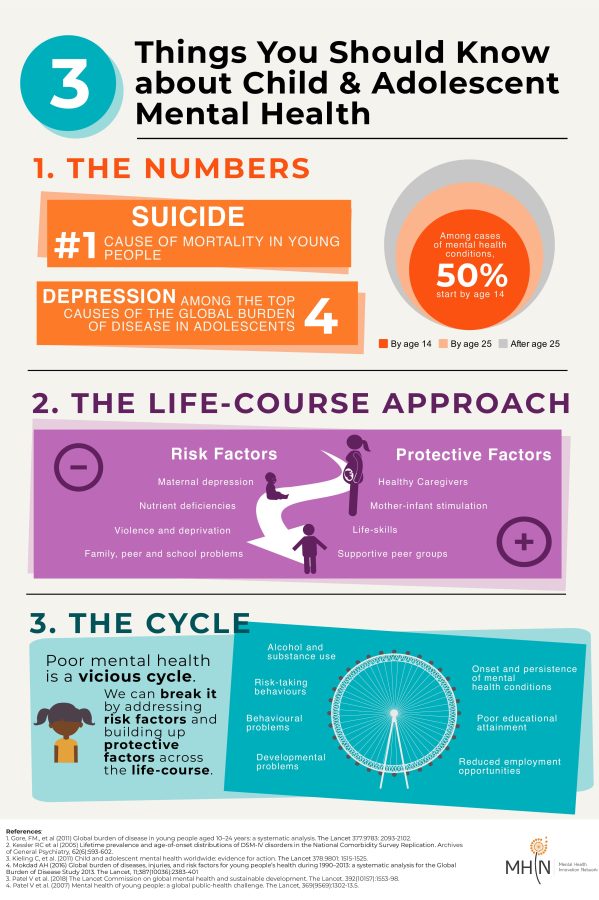Early recognition is key when it comes to mental health issues
There’s plenty of help if you know where to look
March 6, 2023
People of all ages are impacted by mental health, which is an important component of total well-being. Particularly for adolescents, who are going through a crucial period of growth, mental health is crucial in determining how they will turn out.
Adolescent mental health problems can affect a person for the rest of their life, impairing their ability to perform in social, academic, and professional contexts. Thus, it is crucial to comprehend the value of teenage mental health and the contribution that preventative approaches make to the advancement of favorable mental health outcomes.
Adolescence is a time of major shifts and changes where many difficult and perplexing physical, emotional, and cognitive transformations take place. If not handled properly, these shifts can result in tension, anxiety, and uncertainty, which could also lead to mental health issues.
Issues such as depression, anxiety, eating disorders, and substance abuse are prevalent among adolescents.
Adolescents frequently experience mental health problems such as depression, anxiety, eating disorders, and substance addiction. According to studies, adolescent mental health issues can persist into adulthood and present challenges and disabilities that last a lifetime.
Teenagers with mental health difficulties frequently suffer from social and academic challenges, and relationship problems particularly those with relatives and close friends. Academic performance can stem from all these difficulties. Moreover, mental health problems can cause truancy, a decline in academic performance, and decreased grades.
Long-term repercussions of these issues may also include reduced educational achievement, reduced working possibilities, and high poverty. Adolescents’ mental health can be impacted by a number of circumstances like environmental characteristics and genetic factors.
There are plenty of ways to find help at Ben Davis. First, start with a trusted teacher or your counselor. We also have Cummins counselors on hand who are willing to listen and we have a Bring Change 2 Mind club that offers a safe place for students we have a Social Emotional Learning coach Shayla Hampton, who is available Mondays-Thursday in the media center.
Young teens are more inclined to experience mental health concerns themselves if they have a family history of such disorders. Environmental elements including trauma, poverty, and exposure to violence can potentially intensify mental health problems. Mourning, social exclusion, and academic stress are just a few examples of life circumstances that can have an effect on a teen’s mental health.
Adolescents’ mental health can be improved with the use of preventative strategies such as early intervention, screening, and mental health education. Mental health awareness assists with health problems alleviates stigma and provide adolescents with the tools and resources they need to properly manage their mental health.
Early identification of mental health problems can be obtained by screening, allowing for quick intervention and treatment. Encouraging excellent mental health outcomes for adolescents entails a multidisciplinary solution involving parents, schools, healthcare providers, and the community. By establishing a supportive and loving environment in homes, parents may play an important role in supporting their adolescent’s mental health.
Schools may provide kids with mental health information and services while also promoting a healthy school culture that values mental health. Early intervention and counseling for problems with mental health may be provided by healthcare professionals, who can also engage with educators and parents in order to promote improvements in mental wellness.
The community may also help to promote mental health by contributing resources and support. Finally, the significance of adolescent mental health should not be underestimated. Adolescent mental health disorders can have long-term implications for people, including difficulties with social, academic, and professional functioning. As a result, it is critical to identify the variables that lead to adolescent mental health problems in order to develop preventative approaches that promote beneficial mental health outcomes. A comprehensive strategy including caregivers, institutions, healthcare professionals, and communities can be beneficial in ensuring excellent mental health outcomes for adolescents. We can promote healthy development and positive benefits for individuals as well as entire communities by prioritizing mental health during the time of adolescence.












